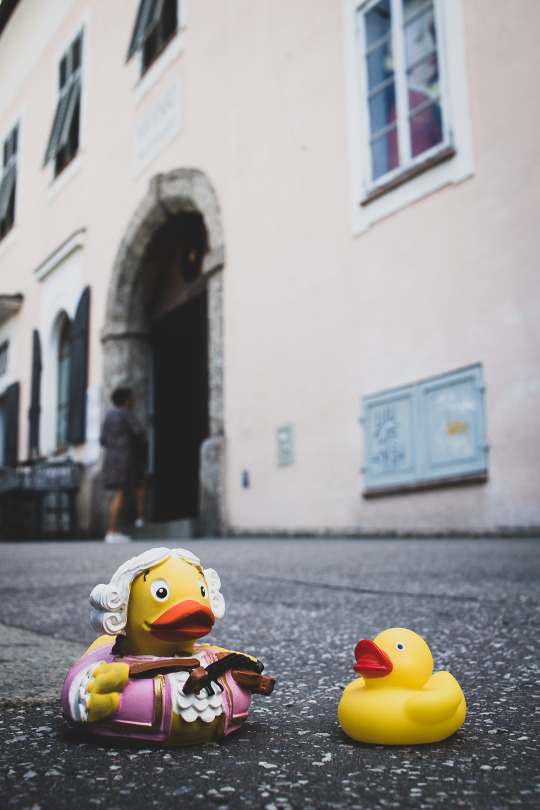Don't wanna be here? Send us removal request.
Link
11 notes
·
View notes
Photo
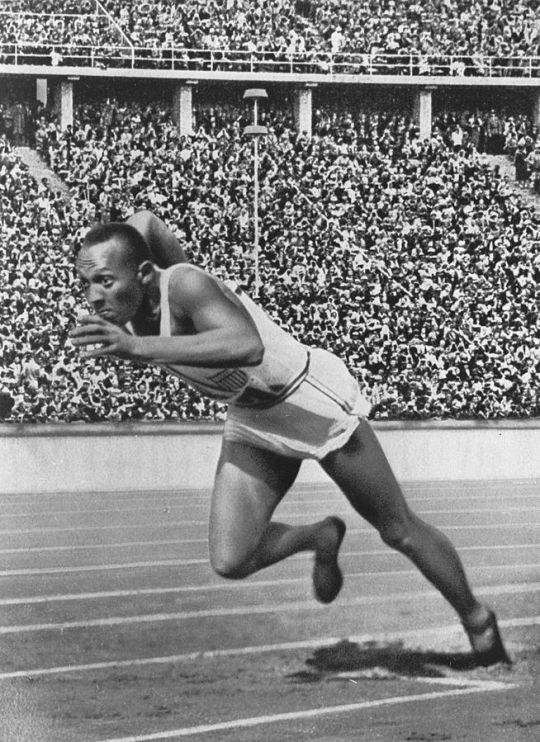
This Day in History: Jesse Owens
On this day in 1990, Jesse Owens posthumously receives the Congressional Gold Medal. Owens is perhaps best known for his stunning performance at the 1936 Olympics, which were played in Nazi Germany just before World War II.
“Mr. Owens, who was black, scored a triumph that would come to be regarded as not only athletic but also political,” his obituary noted. “Adolf Hitler had intended the Berlin Games to be a showcase for the Nazi doctrine of Aryan supremacy.”
Instead, Hitler watched as Owens scored victory after victory.
Who would have known that the son of Alabama sharecroppers would turn out to be such a phenomenon?
The story continues here: https://www.taraross.com/post/tdih-jesse-owens
47 notes
·
View notes
Text
Q&A: What can we learn from historical works of literature about the issues that continue to spark debate and controversy in our contemporary era?
This was another excellent question asked by an audience member during the Book Club meeting. It was great that they asked because we got to acknowledge other historical writers from the past that pubished historical works.
The importance of historical works from writers like me and others is that we get to share anjd provide insight on issues that to this date spark both debate and controvery in our contemporary era today.
These historical works helps us understand deeper into the issue regarding race, identity and power. These all being root of social injustice that are also adressed in the works which give us better insight on the opressed and marginnalized groups.
Historical works emphasiz e the idea that history today is not much different from today as we still push for social change as we continue to fight for both equality and human rights. Not only this, but there are still groups to this day that are being opressed which include LGBTQ groups, people with dissabilities, People of Color, and those belonging in the lower class.
Issues adressed in the historical works, such as mine offer us a better understanding of issues that continue to shape who we are and what our world is becoming.
0 notes
Text
I love to see Women, specifically Black African American women who were once opressed and still opressed to this day fight for equal rights for all and other opressed groups. Their voices matter just as much as others.
If you, like me, wish we spent more time talking about the women of the civil rights movement, here’s a really big moment that often goes unsung: the 1969 Charleston Hospital Strike.
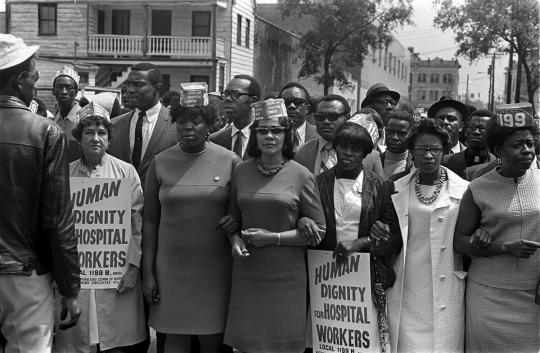
Protesting discriminatory treatment, the unjust termination of 12 employees, and abysmal wages, more than 60 hospital workers, all Black, most women, went on strike for 2 months. The demonstrations they staged provoked a response of over 1,000 state troopers and members of the national guard. The movement was notably supported by Coretta Scott King, widow of Martin Luther King Jr., pictured above (front center).
The investigation of the hospital that followed found 37 instances of civil rights violation, and when the state was threatened with a $12 million cut in federal funds, they yielded, rehiring the 12 employees who had been fired and agreeing to a pay increase.
One of the participants in the demonstrations, Madeline Anderson, since inducted to the Black Filmmakers Hall of Fame, made a phenomenal 30 minute documentary called “I am Somebody”. If you can find it, watch it. I was able to find a DVD at my local public library. If you’re interested in reading what I had to say about the movie, you can read my letterboxd review here.
380 notes
·
View notes
Text
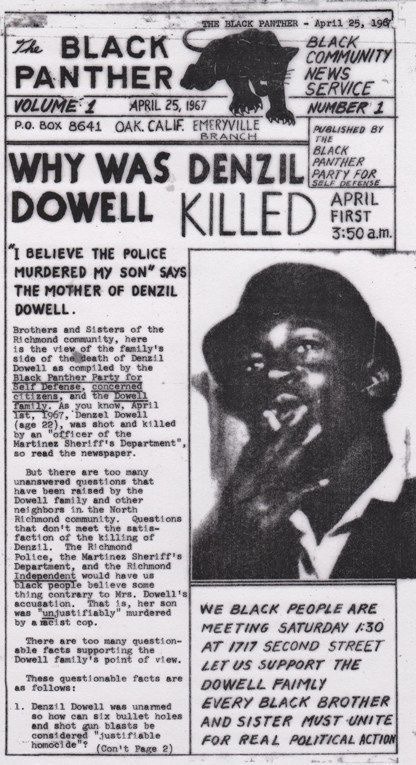
black panther party (bpp) newspaper , April 25, 1967
285 notes
·
View notes
Text
Q&A: My assimilation to white culture?
Someone in the book club that took place in person had asked me how I assimilated to the "white culture" and why I did this. Well what really was my motive?
To start off with, "Others have recently begun to corrwct this one-sided picture by showing that Wheatley was not unmindful of racial concerns, their words still overlook biblical terminology and its implications for slavery"(O'neale). This is one of the ways I assimilated to the white soceity, more specifically their culture as I adopted their religion.
This is important because I used the Christian religion on several parts of my writing to critique the religion itself as it would justify both slavery and the oppresion of Black people. I used my personal experiences when assimilating to the white culture to be able to show and epress my resistance towards the beliefs and values the Christian church held.
O’Neale, Sondra. “A Slave’s Subtle War: Phyllis Wheatley’s Use of Biblical Myth and Symbol.” Early American Literature, vol. 21, no. 2, 1986, p. 144–.
0 notes
Text
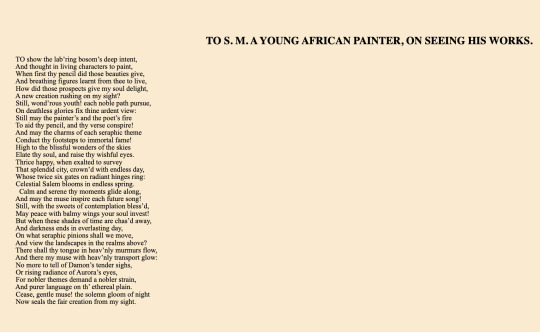
The focus of this poem was a tribute to a young African artist. This was an eye opener as I express and reflect on the difficulties that African Americans face when they pursue their artistic passions that include writing, art, and poetry.
"When first thy pencil did those beauties give, And breathing figures learnt from thee to live, How did those prospects give my soul delight, A new creation rushing on my sight?"(Wheatley Peters).
I expressed my gratitude for the young painter's work and encouraged them to continue with their passion, but I also had to ackowledge that it is not so easy for us African Americans to publish our work as soceity looks down on us. Though that should not stop him, but only encourage them.
1 note
·
View note
Text
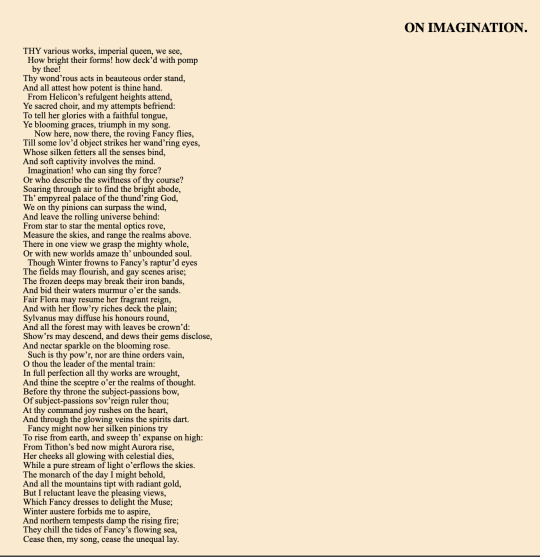
This poem holds the idea of using the imgaintaion to envision a world without the racist attitudes and the abolishment of slavery, and well at that time it seemed like a dream hoping to happen. I try to paint a perfect pretty world as I used descriptive imagery such as,
"Though Winter frowns to Fancy’s raptur’d eyes The fields may flourish, and gay scenes arise; The frozen deeps may break their iron bands, And bid their waters murmur o’er the sands."(Wheatley Peters).
1 note
·
View note
Text
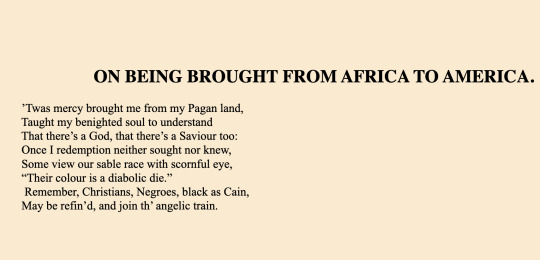
This was one of my first poems which holds alot of meaning as I refect on my experience of being captured from my Homeland to be brought to America sold as a slave. Through this experience, I praised god and expressed my gratitude. "That there's a God, that there's a saviour too"(Wheatley Peters).
This poem I wrote was also intended to captivate the racist attitude towards African Americans, and this is evident through the lines, "Some view our sable race with scornful eye, “Their colour is a diabolic die.” Remember, Christians, Negroes, black as Cain, May be refin’d, and join th’ angelic train"(Wheatley Peters). This is important because I tried to portray the idea of people looking down on Black people because of our color and judged our abilities.
0 notes
Text
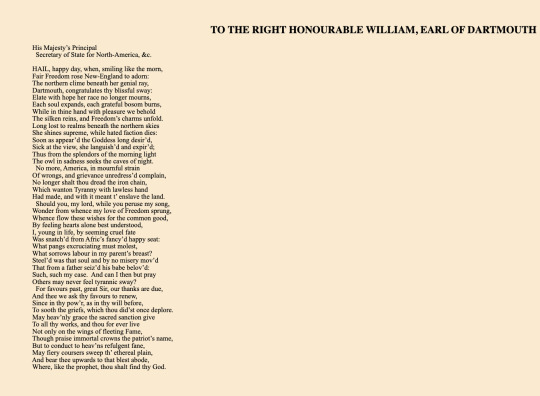
This poem was adressed toe William Legge, Earl of Dartmouth. The purpose of this poem was not only to praise him for his leadership and the influence he has on the British Government, but also my persuassion for help to both end the slave trade and abolish slavery.
"No more, America, in mournful strain Of wrongs, and grievance unredress’d complain, No longer shalt thou dread the iron chain, Which wanton Tyranny with lawless hand Had made, and with it meant t’ enslave the land"(Wheatley Peters).
I was arguing that America is shifting in perspective towards slavery, and that America should no longer tolerate the enslavement and oppression of African Americans. This shows our resilience as African Americans who were fighting for their freedom under slavery.
0 notes
Text
An important note
Throughout my writing, I illustrate how I have adopted the Christian reigion as it was a big part of the "white society" culture. Christianity was not exclusive to the white people as Robert Kendrick said, "As a result, one cannot say that either African or European Americans "belong" in Christian culture. One can only practice "belonging" in Christianity, and racial "marks" cannot determine who practices this process"(Kendrick). I used the christian religion as way to symbolize the contradictions of slavery and the oppression of us Black people.
Kendrick, Robert. “Re-Membering America: Phyllis Wheatley’s Intertextual Epic.” African American Review, vol. 30, no. 1, 1996, p. 71–.
0 notes
Text
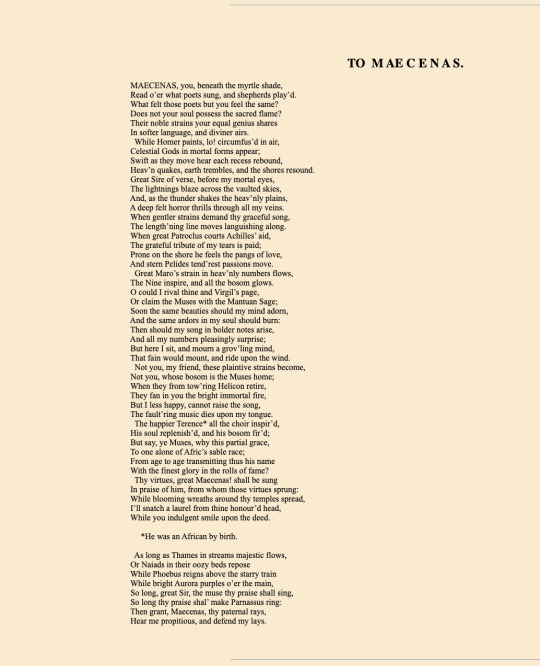
The first poem, I will be analyzing is the first poem in the book, "To MÆCANAS”.
To be clear, this was an ode to the Ancient Rome patron, Gaius Cilinius Maecenas. With this poem, I was showing my praisal towards him and I was also incorporating greek mythology into my writing. "the length’ning line moves languishing along/When great Patroclus courts Achilles’aid/ The grateful tribute of my tears is paid”(Wheatley Peters 16-18). One of my greatest achievments in writing was my ability to acknowledge other literature that was not just American.
Anyways, this poem is significant because I used this poem as a way to ask Maecenas for his further continued support on my journey of becoming a writer as he is patron of the arts.
0 notes
Text
I love these modern-day poets, such as Rupi Kaur. It reminds me of how far we have come when it comes to writing and literature.
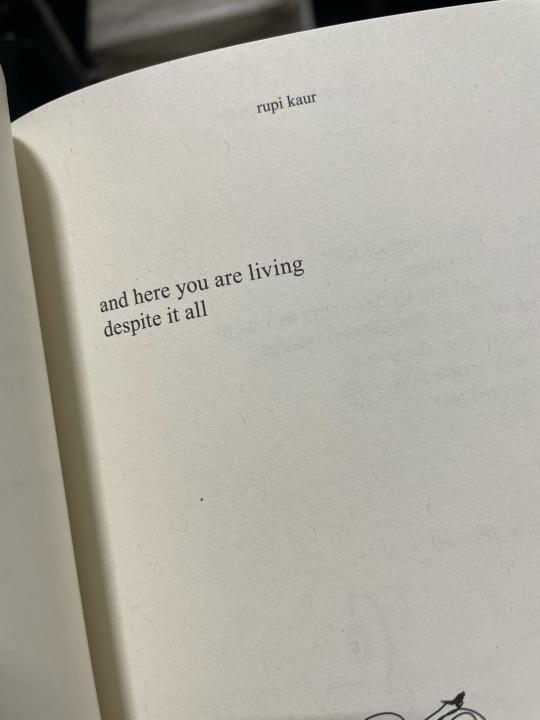
582 notes
·
View notes
Text
A little into my past...
I was born in Africa and was brought to be a slave, where I branched out to write poetry. I was the first African woman to publish their poetry. Yes, everyone was shocked as my ability to be able to write in the English language surprised others. The "white" people were suprised that Africans like me, were just as capable as them to be able to read and write. I believe my writing gives insight into my history as an enslaved woman and my resilience in which I am glad I can share with you all.
0 notes
Text
Introduction
Hey all, welcome! If you missed my live book club, no worries I will give a recap of my book club and just what is on my mind! Just sharing a couple of poems, and what my ideas were behind them.
The book I will be focusing on is my very first published book, "Poems on Various Subjects, Religious and Moral".
Feel free to drop down any questions as I will be answering two important questions from the Q&A part of the book club meeting.
0 notes
Photo

#nationalmuseumofafricanamericanhistory #washingtondc #phylliswheatley (at National Mall)
1 note
·
View note
